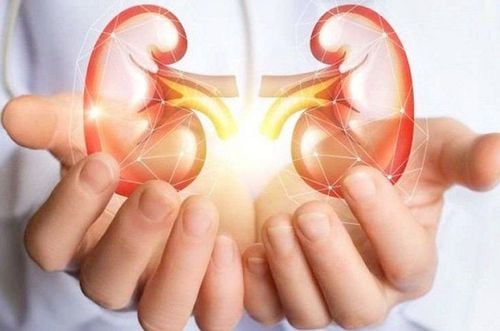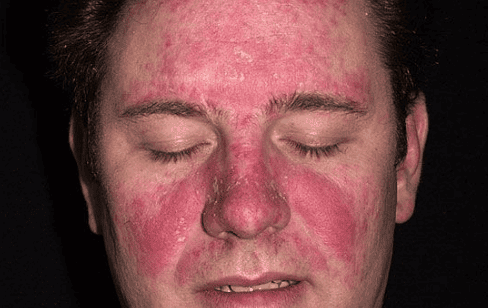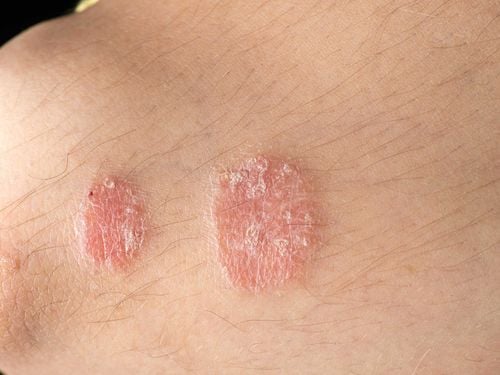This is an automatically translated article.
People with psoriasis tend to have one or more other conditions, including chronic kidney disease caused by inflammation. To treat psoriasis, your doctor may need to monitor the condition of your kidneys.
1. What is psoriasis?
Psoriasis is a common skin disease. This is a skin condition where red, itchy, scaly patches appear on the top and often appear in areas of skin that are prone to friction such as the knees, elbows, trunk, and scalp.
People with psoriasis will also have one or more other conditions. Inflammation is thought to be the cause of this condition. Many studies show that psoriasis affects the risk of chronic kidney disease. In addition, there are some conditions that accompany psoriasis:
Cancer: You are more likely to get certain types of cancer, such as skin cancer, lymphoma. If you have psoriasis or psoriatic arthritis, get a cancer screening test to detect health abnormalities early. Cardiovascular disease is a condition in which fat builds up inside the blood vessels, which can lead to heart disease and heart attacks. Crohn's Disease Depression: People with psoriatic arthritis may be more prone to depression than people with psoriasis alone. Diabetes: About 1 in 5 people with psoriatic arthritis also have diabetes. Diabetes is a condition of high blood sugar. Obesity is a cause of diabetes and psoriasis. Some medications that can treat psoriatic arthritis also make you more likely to develop diabetes.

Hình ảnh bệnh Crohn
Gout: Gout is a type of arthritis that occurs when uric acid builds up in your body and forms crystals in your joints. It usually appears first on the big toe, knee, and ankle. Patients with psoriasis are five times more likely to develop gout. Hearing loss: Psoriasis and psoriatic arthritis are both linked to hearing problems. One study also found that one-third of people with psoriatic arthritis had hearing loss compared with only about 7% of those without the disease. In either case, the researchers suggest that the body's autoimmune system may be attacking parts of the ear in the same way it attacks the joints. High blood pressure: More than a third of people with psoriasis have high blood pressure. Liver disease: People with psoriasis and psoriatic arthritis may be more susceptible to nonalcoholic fatty liver disease (NAFLD). This is a condition in which fat builds up in liver cells, causing it to swell, which can lead to scarring (also known as cirrhosis) or liver failure. Metabolic syndrome: This group of conditions, which includes heart disease, belly fat, and high blood pressure, is closely associated with psoriasis. One study of 6,500 people found that 40% of those with psoriasis had metabolic syndrome, compared with only 23% of the general population. Lung problems: The inflammation that accompanies psoriatic arthritis can also cause interstitial lung disease. Symptoms may include shortness of breath, cough, and fatigue. Obesity Stroke: Patients with psoriasis have an increased risk of having a stroke. Uveitis: This condition affects about 7% of people with psoriatic arthritis.

Viêm màng bồ đào có ảnh hưởng khoảng 7% những người bị viêm khớp vẩy nến.
2. The link between psoriasis and chronic kidney disease
Researchers indicate that the risk of chronic kidney disease related to psoriasis increases with age. In patients aged 40 to 50 years with severe psoriasis, the incidence of additional chronic kidney disease was 1/134 patient year. In people aged 50 to 60 years, the annual incidence of chronic kidney disease is 1 in 62 patients.
People with moderate to severe psoriasis have an increased risk of chronic kidney disease and need to be closely monitored for kidney problems. Researchers in Philadelphia analyzed data from nearly 144,000 people between the ages of 19 and 90 with psoriasis; compared with a group of nearly 690,000 adults without the condition.
During seven years of follow-up, people with psoriasis were more likely to develop chronic kidney disease than those in the control group. According to the data, people with severe psoriasis were nearly twice as likely to develop kidney disease and four times more likely to develop kidney failure requiring dialysis.
Further research focusing on the number of people whose skin is affected by psoriasis shows that people with moderate to severe psoriasis have a higher risk of chronic kidney disease. People with moderate psoriasis have 3% to 10% of the skin area affected. While people with severe psoriasis have more than 10% of the skin area affected.
Vinmec International General Hospital with a system of modern facilities, medical equipment and a team of experts and doctors with many years of experience in medical examination and treatment, patients can rest assured to visit. examination and treatment at the Hospital.
If you have a need for consultation and examination at the Hospitals of the National Health System, please book an appointment on the website for the best service.
Please dial HOTLINE for more information or register for an appointment HERE. Download MyVinmec app to make appointments faster and to manage your bookings easily.
References: medscape.com, webmd.comSEE MORE
Psoriasis Hard to Cure Psoriasis Complications of Psoriasis Side effects of corticosteroids used to treat psoriasis













